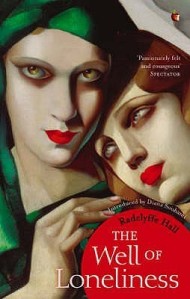The story follows the life of Stephen Gordon, an Englishwoman from an upper-class family whose “sexual inversion” (that is, homosexuality) is apparent from an early age. She finds love with Mary Llewellyn, whom she meets while serving as an ambulance driver in World War I, but their happiness together is marred by social isolation and rejection.
My Thoughts:
Boy, was this book a product of its time. The title is spot-on in describing the mood of this novel. The Well of Loneliness is a thinly veiled account of the author’s own life as a lesbian in the 1920s and earlier, and it was very depressing.
Don’t get me wrong; I’ve wanted to read this book for a long time, and I’m very glad to have read it and experienced it. But I struggled through it. It was draining.
The main character, a lesbian named Stephen, grows up feeling very different from everyone around her, although she doesn’t have a name for this difference. She begins an affair with a married woman who abandons her, and eventually she falls in love with a woman she met during WWI. The entire book paints lesbians and gay men as social outcasts, sexual deviants, freaks of nature–which is how society viewed them at that time. Stephen is hyperaware of just how extremely heavy the burden of her “deviant sexuality” is. She is rejected by her mother and by others in her life, she struggles to find friends and to create a social life, and eventually she tricks her lover into ending their relationship with the hope that her lover will marry a man and thus be saved from the difficult life of a lesbian.
This book was immediately banned in many places when it was published, and it almost ended Radclyffe Hall’s career. I think she is remarkably brave for having written it, and I think it does inspire sympathy and increase understanding of the burden that society placed on gay people back then. (One minor lesbian character committed suicide; another struggled with immense guilt because of religious oppression.)
Although I would have loved to see Stephen take joy in her sexual orientation, that is perhaps not realistic for its time. Stephen did the best she could in an extremely oppressive society, even maintaining faith in God despite the way the world treated her.

